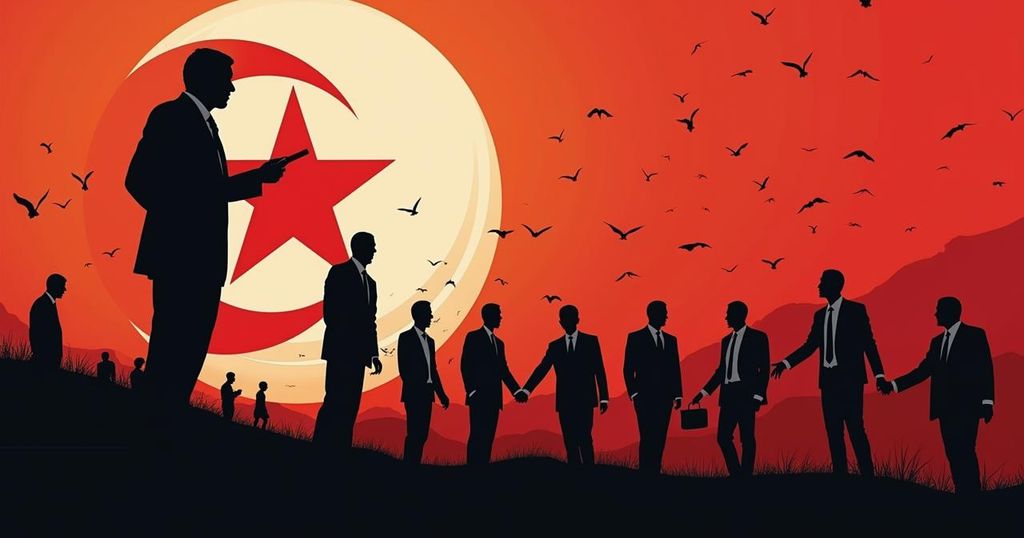Tunisian Presidential Election: An Overview of Candidates and Democratic Uncertainties

Tunisia’s presidential election on October 6, 2023, will see incumbent President Kais Saied face two candidates—Zouhair Magzhaoui, seen as an ally, and Ayachi Zammel, who is currently imprisoned. The election is marred by accusations of manipulation, restrictions against opposition candidates, and severe limitations on civil liberties, setting a precarious stage for Tunisia’s democratic future.
On October 6, 2023, Tunisia is set to conduct the first round of its presidential election, amidst considerable controversy and allegations of electoral manipulation favoring the incumbent, President Kais Saied. The electoral landscape is notably restricted, permitting only two candidates to run against Saied: Zouhair Magzhaoui, a left-wing nationalist viewed as merely a puppet candidate supporting Saied, and Ayachi Zammel, the imprisoned leader of the liberal Azimoun party. Zammel’s candidacy is particularly striking; despite recently being sentenced to a total of 32 months in prison for allegedly falsifying documents in relation to his candidacy, he continues to appear on the ballot. Critically, Zammel asserts that the charges against him are fabricated and politically motivated. The electoral authority, the Independent High Authority for Elections (ISIE), disqualified the majority of candidates, leading to wide-scale allegations of an unfair election process favoring the sitting president. Following an alarming pattern, numerous high-profile politicians opposed to Saied have faced imprisonment or disqualification from the electoral process, largely since Saied’s assumption of power in July 2021, when he initiated sweeping reforms that diminished the power of institutions like the Administrative Court. This court had previously served as a bastion of judicial independence within Tunisia, yet was rendered impotent following legislative changes controlled by Saied’s administration. Protests have emerged in response to what many perceive as an increasingly authoritarian regime. Activists are demanding an end to civil liberties breaches and the reinstatement of free and fair electoral practices, reminiscent of Tunisia’s revolutionary past. However, such expressions of dissent face significant suppression under laws aimed at curtailing freedom of speech, such as Decree 54, which criminalizes misinformation online. Despite the oppressive political climate, President Saied maintains a degree of support among citizens disillusioned with traditional political figures and practices, positioning himself as a solution to the country’s longstanding issues of corruption and inefficiency. However, voter turnout has been dismally low in recent electoral contests, indicating a broader unwillingness among the populace to engage in the electoral process under the current conditions.
The upcoming presidential election in Tunisia, scheduled for October 6, 2023, is framed by significant public discontent and skepticism regarding the integrity of the electoral process. This election is not only a competition between candidates but also a focal point for expressing broader societal frustrations with the current administration. Under President Kais Saied, who seized power through controversial reforms in 2021, many politicians and opposition leaders have been jailed or barred from running, leading to cries of undemocratic practices. The control exerted by the current leadership over the electoral institutions, notably the Independent High Authority for Elections, raises serious questions about the credibility and fairness of the election outcome.
The impending presidential election in Tunisia reveals stark contrasts between the political ambitions of candidates and the realities of an increasingly authoritarian regime. Both candidates—Zouhair Magzhaoui, perceived as a tool of the president, and Ayachi Zammel, imprisoned under dubious charges—reflect a limited choice for voters in a highly controlled electoral framework. The significant constraints imposed on political opposition and civil liberties signal troubling implications for the future of democracy in Tunisia, which has faced substantial setbacks in political freedoms since Saied’s power consolidation began. The upcoming election could either consolidate Saied’s grip on power or ignite further public discontent, depending on voter engagement and international scrutiny.
Original Source: www.aljazeera.com






